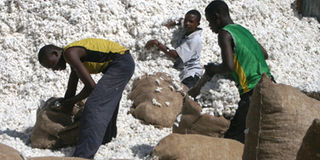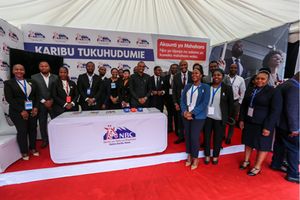Contract farming ‘here to stay’

Workers sorting out harvested cotton on a farm. PHOTO | FILE
What you need to know:
The sub-sector’s performance during the aforementioned period shows that its value chain; including farming, marketing, processing and other related economic activities benefits 19 million people.
Mwanza. Cotton farming, which is among the key sub-sectors in the Tanzanian economy, has registered a significant growth in the 2016/17 season.
The sub-sector’s performance during the aforementioned period shows that its value chain; including farming, marketing, processing and other related economic activities benefits 19 million people.
This is equivalent to 40 per cent of at least 51 million Tanzanians, according to the current National Bureau of Statistics records.
The report released by the Tanzania Cotton Board (TCB) general manager, Mr Marco Mtunga also shows that there will be a significant increase in production this season.
Mr Mtunga attributed the increase in production to contract farming in some regions, naming Mara and Mwanza as the regions with bumper production.
The increase in cotton production has been realised after a downward spiral in production from the 2012/13 to 2016/17 seasons.
While the production was 357,133 tonnes in 2012/13 season, the number dropped to 245, 815 tonnes in the 2013/14 season.
In 2014/15, production further dropped to 202, 312 tonnes before plunging to 149, 767 tonnes in 2015/16.
Despite efforts to reverse the trend, the cotton production in the 2016/17 season hit a new low as 122, 362 tonnes only were produced.
Nonetheless, the introduction of contract farming in 2017/18 season, mainly in Mara and Mwanza, is expected to rise the production to at least 132, 928 tonnes.
Other regions where cotton is grown are Geita, Simiyu, Shinyanga, Katavi, Kagera, Kigoma, Singida, Coast, Morogoro, Tabora, Tanga, Kilimanjaro and Manyara.
Contract farming
Contract farming aims at improving cotton production, input supply and accessibility to farmers, and cotton quality from the farm level to ginning.
The goal also is to enable farmers to have a collective say on issues pertaining to cotton farming and business.
Through contract farming, the farmers’ business groups have been empowered on agricultural business management and good agronomic practices with a view to making their groups creditworthy and commercially viable agribusiness entities.
Farmer’s business groups may negotiate contracts with ginners to collect; bulk, store and transport cotton to ginneries, and reduce transaction costs of service delivery to farmers.
This system will automatically sideline middlemen, some of them being or using politicians by denying them the brokerage role and influence over decisions making.
Contract farming challenges
Despite the benefits gained, contract farming now threatened by several factors including lack of enough information on its benefits among many farmers and opposition from some stakeholders such as investors who do not want to invest in farmer’s empowerment.
Some groups including local government authority and political leaders in collaboration with cotton buyers agents, who have been benefiting from the uncontrolled system are also raising their voices against the new system.
Political interference
Someone might be asking or wondering why cotton sub sector is such a big deal when it comes to political gains in and around major cotton growing regions? The answer is short and clear.
Most of the politicians are capable of analysing the situation and come up with an approach that will only serve to give them political milage.
In order to stay relevant in politics, some of the politicians gain political advantage at the expense cotton farming by speaking what resonates with grievances of the farmers.
They normally create the problems and at the same time proposing solutions. This gives them credit as solution finders before the public (the voters).
The cotton crop has so much importance to the economy and livelihood of people in the regions that grow it. It is mainly grown in the Lake Zone regions.
Being a major cash crop in the area, the cotton crop has a major impact on overall agriculture sector in these regions.
Due to its economic importance, the cotton sub-sector is one the political focal point in these areas.
Because politicians are probably the best when it comes to mobilising power, those opposing contract farming tend to use political platform to push their agenda.
Knowing or without knowing, some politicians are using their political mobilisation power to affect the sub-sector in their respective areas.
Some political leaders and government officials, including District and Regional Commissioners from and outside 17 cotton growing regions are publicly opposing contract farming, which has not only guaranteed farmers access to quality seeds, but also market their product through their contract with companies and some ginners.
This has led to the never-ending political interference, which continues to be a major drawback in the development of the cotton farming sub-sector.
Cooperative Unions
Lately, government officials including the minister for Agriculture, Dr Charles Tizeba were quoted inspiring farmers through government’s assistance to re-introduce Cooperative Unions as a tool to deal with wanting productivity.
Apparently, there is an agenda being pushed to do away with the current contract farming as the Prime Minister, Mr Kassim Majaliwa, was quoted as saying during his official visit in Mara Region recently.
It is not my intention to challenge the Cooperative Unions idea. Neither do I intend to advocate for cotton contract farming.
My worries are the historical background we had about the Cooperative Unions.
So far, tens of hundreds of farmers in this country still have unhealed wounds from such cooperative unions.
There are some farmers who have not been paid their remaining money due to bad performance of the unions.
Some Cooperative Unions do not have their own warehouses, office and staff.
In the situation we are now, It is puzzling to see the leaders advocating for cancellation of contract farming instead of leaving the system work alongside with the Cooperative Unions in order to reduce bureaucracy.
Farmer’s problems and agendas
The biggest problem facing farmers is the need and assurance of agricultural input, education and service from extension officers as well as markets for their products. Having or not having Cooperative Unions is not their top priority.
An important factor to be emphasized by the government and other stakeholders is how to maximise productivity in the agricultural sector through education, input and market assurance.
This will not only increase farmer’s income by producing 800 to 1, 200 kilogrammes from a one-acre farm instead of the current 200 to 300 kilogrammes, but also will automatically settle the price issue. Government will also benefit from revenue collection.
What to be done
Stakeholders say instead of politicizing Cooperative Union agenda and contract farming, the government should address all factors that led to the collapse of our former cooperatives; and come up with foolproof plans.




